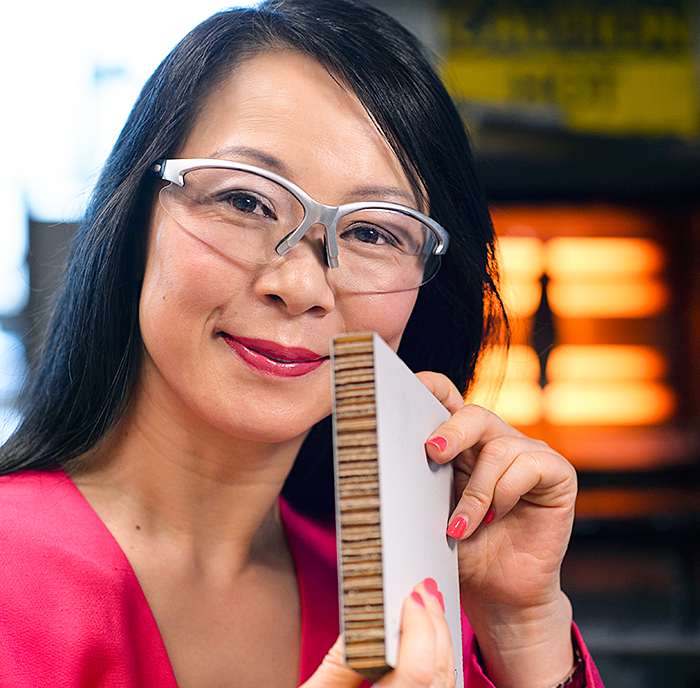Shanying Zeng: Researching a better way

Technical Fellow Shanying Zeng holds a sample of material treated with a new flame retardant that will be tested in Boeing’s flammability laboratory. Zeng helps lead Boeing’s strategy to reduce hazardous chemicals in products and services, which includes testing environmentally responsible flame retardants for aircraft interiors. (Boeing photo)
As a lead research engineer for environmental technology at Boeing, Dr. Shanying Zeng said in one sense her job is pretty simple: “I support Boeing’s commitment to the environment by helping to get bad stuff out of our aircraft and good stuff into our products.”
Zeng is a Technical Fellow in the Chemical Technology Group in Seattle. She leads a group of scientists and engineers who are helping Boeing and the aviation industry find environmentally progressive alternatives for hazardous chemicals and material used in commercial and military aircraft.
One example is the chemical widely used as a flame retardant on surfaces and parts throughout most aircraft. Manufacture and import of the chemical in the United States were phased out at the end of 2013 because of concern over its effects on human health and the environment.
“Finding suitable replacements for the chemical has been a challenge. It was used on more than 155 materials on our commercial and military products,” Zeng said. In addition to being less toxic, replacements must meet stringent aerospace performance requirements.
The focused research at Boeing and collaboration with suppliers and industry groups around the globe have led to the development of effective alternatives for 154 of these aircraft applications, Zeng said.
“I’m confident we will have the right solutions in place as new chemical options are developed,” she said. “And we won’t stop there; we are always looking one step ahead.”
Boeing is collaborating with Texas A&M University on a novel flame retardant technology that involves environmentally progressive coatings that could be applied to existing airplane interior materials, Zeng said.
One of the biggest environmental challenges facing the industry, Zeng said, is reducing and eliminating hexavalent chromium, or chrome, a toxic metal commonly used in aircraft paints and primers to resist corrosion. Boeing has been a global leader in researching effective chrome replacements, and now uses chrome-free paints and primers on an increasing number of its military and commercial products.
Zeng is confident that sustainable materials made from renewable resources will find applications on Boeing commercial aircraft. For example, Boeing and its research partner Commonwealth Scientific and Industrial Research Organization in Australia are developing advanced materials that could be used in an aircraft’s interior panels.
Environmental challenges facing the aerospace industry are bringing together airplane manufacturers, suppliers and research organizations around the globe to find solutions. Zeng is Boeing’s technical expert on the International Aerospace Environmental Group, which is developing common procedures and requirements for environmentally progressive alternatives to regulated materials, such as chrome.
Zeng’s leadership in environmental R&D has brought her high-level recognitions and awards, including the 2014 Asian American Engineer of the Year, an honor given by the Chinese Institute of Engineers – USA.
Zeng said it’s the feeling of being able to make a difference that makes her work at Boeing so rewarding. “I was part of the team that developed the carbon-fiber composite material used on the 787 Dreamliner™. Now when I see the 787 flying, I think ‘Wow, I wasn’t just doing R&D. This really is a special place to work’.”

